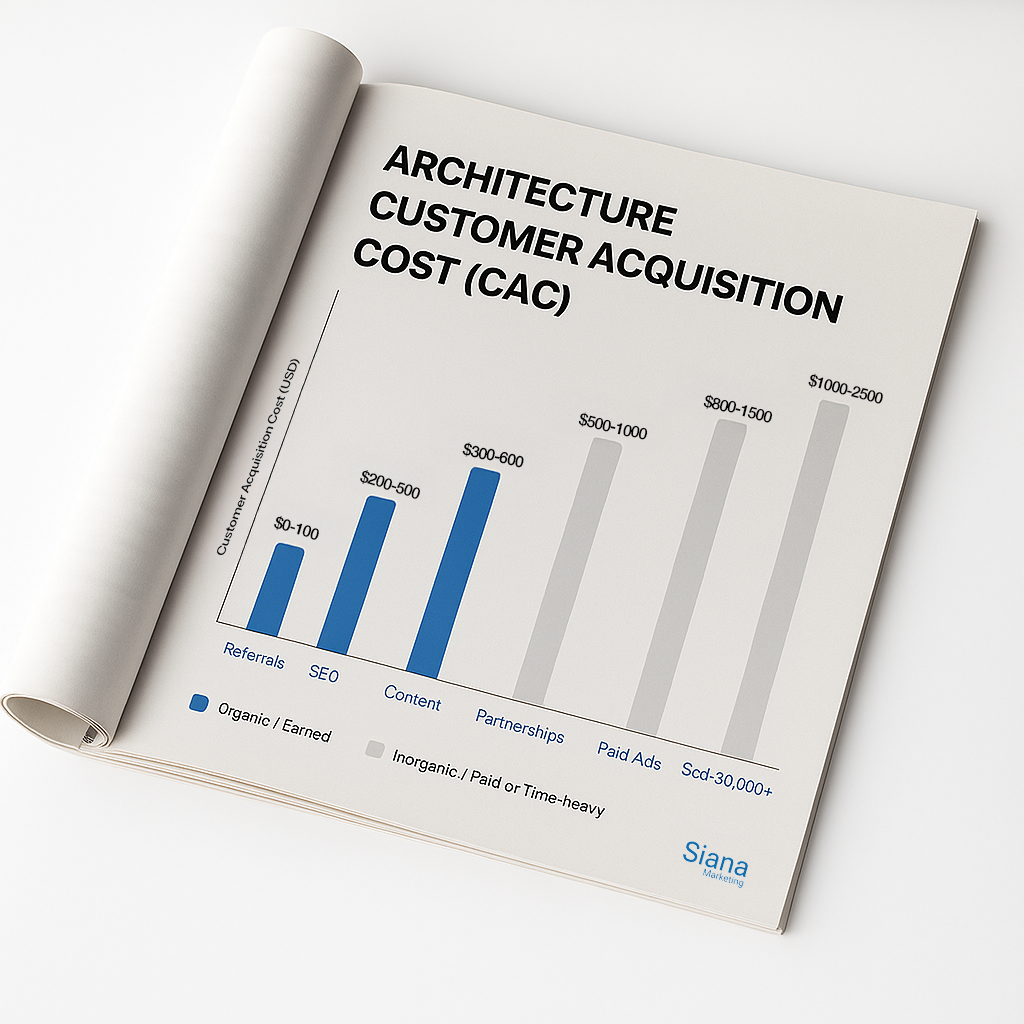Architecture Customer Acquisition Cost (CAC): 2025 Benchmarks
For architecture firms, bringing in new clients is one of the toughest challenges. Winning a project often means months of conversations, proposals, and trust-building before a contract is signed. That’s why Customer Acquisition Cost (CAC), the cost to win a new client, is such a critical metric.
Understanding CAC helps firm principals and marketing leads decide where to invest: should you rely on referrals, pursue RFPs, run ads, or build an online presence? This report breaks down CAC benchmarks for architects in the U.S. by project type and acquisition channel, and highlights why firms that invest in SEO consistently achieve the most efficient, scalable growth.
In This Report:
1. What is CAC for architects and how to calculate it?
Customer Acquisition Cost shows the total investment required (including all marketing and sales expenses) divided by the number of new clients gained during a specific period. A lower CAC means more profitable and efficient client generation, while a high CAC signals potential inefficiencies in marketing or client targeting.
All figures reflect newly acquired projects, not repeat clients.
This analysis combines data from AIA and SMPS reports, CAC benchmarks, and surveys from architecture marketing consultants. We cross-referenced these with case studies and real-world feedback from firm principals to produce the following benchmarks.
2. Overall Findings
As of 2025, the average CAC for architects in the U.S. ranges from $500 to $15,000 per client, depending on project type and acquisition channel.
Residential projects are cheapest to win ($500–$2,500) since they’re referral-driven.
Commercial projects average $2,500–$7,500 due to longer cycles.
Public/institutional projects can reach $8,000–$15,000, reflecting proposal and RFP overhead.
SEO consistently delivers one of the lowest scalable CACs (~$200–$500), far outperforming paid ads and RFPs.
3. CAC by Lead Source
Key Insight: Referrals are nearly free but can’t be scaled. SEO sits in the optimal position: low CAC and repeatable, unlike RFPs or ads that inflate costs.
| Acquisition Channel | Avg CAC per Client | Notes |
|---|---|---|
| Referrals | $0–$100 | Nearly free, but not scalable |
| SEO (Organic Search) | $200–$500 | Consistently the lowest scalable CAC |
| Content Marketing | $300–$600 | Blogs/case studies; strengthens SEO |
| Partnerships (Contractors, Developers) | $500–$1,000 | Strong ROI; depends on reciprocity |
| Paid Ads (Google/Meta) | $800–$1,500 | Higher CAC due to competitive keywords |
| Networking & Events | $1,000–$2,500 | Time-heavy but high close rates |
| RFP Platforms | $5,000–$12,000 | High proposal cost; low win rates |
| Cold Outreach | $10,000+ | Least efficient; very low response rates |
4. CAC by project
Key Insight: Residential work is cheapest to acquire but limited in volume. Public projects carry the highest CAC but come with larger fees. Commercial and multifamily projects are in the middle - where SEO can dramatically reduce acquisition costs compared to traditional BD.
| Project Type | Avg CAC per Client | Notes & Sources |
|---|---|---|
| Residential (single-family) | $500–$2,500 | Referrals drive ~65% of new projects. Lead-gen sites (Houzz/HomeAdvisor) average ~$40 per lead, 10% conversion → ~$400 CAC. |
| Multifamily Housing | $2,000–$5,000 | More BD required. Proposals take ~32 staff hours with ~40% win rate. |
| Commercial Offices | $3,000–$7,500 | Longer sales cycles. Construction firms average $212 CAC via SEO vs $486 via paid ads. Commercial pursuits add travel and meetings, raising CAC. |
| Retail & Hospitality | $2,500–$6,000 | Relationship-driven. Developers and business owners “prefer architects they know”, making networking and partnerships key. |
| Public / Institutional | $8,000–$15,000 | RFP-heavy. Avg proposal = 32 hrs, ~37–44% win rate → several proposals needed per win, pushing CAC into five figures. |
5. Optimization Recommendations
Prioritize SEO + Content: Capture high-intent searches (“architect [city]”) at low CAC.
Maximize Referrals, but Build Parallel Inbound: Referrals plateau; SEO ensures steady growth.
Be Strategic With RFPs: Only pursue when odds are strong; otherwise CAC balloons.
Track CAC-to-Fee Ratios: Keep CAC under 10% of project fees; SEO aligns naturally.
Invest in Trust Content: Case studies and guides strengthen SEO and close rates.
If you’d like to know more about using organic marketing channels to lower your CAC, feel free to get in touch.




